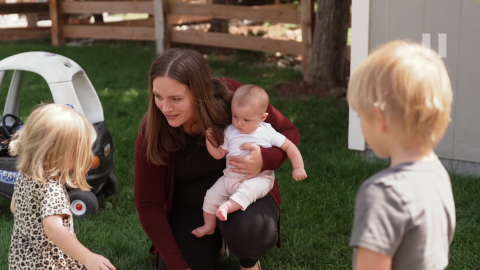Singer Brandon Heath Takes Us to "Blue Mountain"
CBN.com - Contemporary Christian music artist Brandon Heath fondly recalls visiting the Smokey Mountain area of Tennessee as a young boy. It's that scenery that helped inspire his new album, Blue Mountain. The imaginary mountain sets up the 11-track project, with each song telling the story of different characters living in the hills.
The "Give Me Your Eyes" songster recently spoke with CBN.com about making Blue Mountain and the stories behind some of the album's new songs, including the record's first single, "Jesus in Disguise".
Hannah Goodwyn: You've established yourself as a songwriter. But, each of the songs on Blue Mountain is a story. Where did the inspiration for storytelling through music come from?
Brandon Heath: A lot of it started with me going back to my roots a little bit…. I've always loved like Harry Chapin and David Wilcox, storytellers in music. So, to me, it just made sense to go that direction. For me, I needed to find something of a muse or a setting for everything. I was having a conversation with our counselor one day, who gives me ideas for records all the time. He doesn't know that he's doing it, but just talking to him I have the idea for this. It came out of a conversation about somebody I was having a hard time with, just being a little envious of. He said, "Hey, have you ever heard of Blue Mountain people?" I said, "No, what does that mean?" He said, "Well, some people are like the Blue Mountains. They're blue, majestic in the distance, and you can't ever get close to them. But if you do, you'll see that they're just brown and green like everybody else." And I thought, "Wow! That's a really great thought."
At first I thought about calling the record "Blue Mountain People", but that sounded like Smurfs. So I was like, "Nah, I can't call it 'Blue Mountain People'." So I just called it "Blue Mountain". And I started writing about people that live on Blue Mountain that would give you a closer look of what it actually is.
Growing up, going to the Smokies on the weekends with my mom and my step-dad, it was always interesting to go into that region and find the people that live there. It's not just a tourist place. There are actually people that live there in those hills. I wanted to write about them, tell their story.
HG: The first single from Blue Mountain is "Jesus in Disguise". What's the story behind it?
BH: There are a couple of guys that I wrote it with, Lee Miller and Ross Copperman. Lee just came in with the idea for "Jesus in Disguise". As I was writing [Blue Mountain], I would always try to come up with a character in my head to use as a sounding board for the song. I thought about this old blind man that lives up on Blue Mountain, and a young man comes to him. He says, "You know, I keep hearing about Jesus, but I can't see Him. I'm having a really hard time believing in someone that I can't see." The blind man, he has a Morgan Freeman kind of voice, and he says, "Follow the way that you might have never realized that you heard or seen Jesus."
I think about that verse in the Bible that talks about, "When I was naked, you clothed me. When I was hungry, you fed me." Jesus coming to us in all of those different forms, but not in a way that we would expect.
That's why I wrote it the way that I did, in code a little bit, almost to keep to form—we're talking about something in disguise, disguise it a little bit. I'm not real up front all the time, which I'm sure a lot of people would rather I was. But, this is the way that I love to communicate and write. If you're trying to bring an idea to life, you have to write from that same perspective a little bit. Disguise it a little bit. I have so much more enjoyment doing it that way than spelling it out.
HG: It's the discovery.
BH: Yeah. Mother Theresa even talked about spending time with the poor. She would wake up greeting people at her doorstep or people there living in her commune. She said, "I spend all day with Jesus. These people are all hurting, orphans and widows, the forgotten. They are all Jesus in disguise," she says.
HG: That leads right into your new song on the record, "Love Does", which is inspired by your friend, author Bob Goff. You've said that he liberates people and that there isn't anything nobler than that.
BH: We've had about a 10-year friendship. He's really the guy that talked me into doing this music thing. What he did was just ask me about my dreams; and they were so buried in there. Maybe I was so afraid of them that I'd never think about them myself. But, number one, he gave me permission to dream. Then he was just like, "Well, I'm for you. So, how do we do this?"
The best way to describe Bob… He's a fireworks technician. He loves finding people's fuse and lighting it, and standing back and watching them explode into something beautiful. He searches for people's fuses and ignites them. That's what he's done to me. He's taken me all over the world. I've been to India, China and Africa with him. Basically, he's the first guy to take me to a third world country and push the limits on what I thought I was capable of doing. It's liberated me.
HG: "Diamond" is your new song about a miner. What's his story?
BH: I think for him, that coal miner, I really wanted him to just ask God in his own purpose-driven life way, "Hey, like I'm happy to be this coal miner, but what else is there for me?" Because I mean, I ask myself the same question, like, "God, I love being a musician, but I just know that there's more. My identity is not, 'I'm a musician.' What's the real treasure in me?" Because only God can dig deep enough to find it. I wanted him to just outright say it, you know, "I've got treasure up in Heaven." So, I don't necessarily need it down here; I don't need to be wealthy or anything, but, "Tell me, what is it that you have for me here, other than just being a coal miner?"
HG: "Paul Brown Petty" was inspired by your grandfather, correct? It sounds like he was the kind of man you want to be.
BH: Absolutely. In a very sentimental way, I've wanted to buy their old house. It's true that he did build their house, down by a creek. There's an old lady that lives there right now, and I'd like to go buy it, and just carry on his legacy. The thing about him here is that he was just a good man. He wasn't anything noble. I mean, I guess he was noble because he was a good husband and a leader in his community, in his church. He was just a good, loving granddad to me. It was in a time where I needed it, not that you didn't ever need it. But I just needed a good man leading the rest of my life. He was what I needed as a kid. He gave me permission to go be a boy, and in the process taught me to be a man.
HG: This song also serves a reminder to honor our elders. Just think about 50, 75 years ago, what was the world like? The sacrifices they made and the wars they fought. Your grandfather put one foot in front of the other and kept his family together. That's a legacy. That's noble.
BH: When I've played it, it's always men that come up to me after and say, "I love that song about your granddad." They'll say, "it just reminds me of mine." I would always see a guy in the audience crying in that song. I'm like, "OK, yep. That's it for me, I'm done." I'll start crying.
HG: "Dyin' Day" is about a prisoner on death row and the revelation of forgiveness he gets. But there's also a sense of the Prodigal Son story in it. It's the shamed man needing mercy and the guard who is in right standing. We're on both sides of the bars many times.
BH: Oh, yeah! Absolutely. Wow! What a great way to look at that! But you know what I was thinking about is that guard had some things that he needed to be forgiven of, but he didn't understand forgiveness nearly as well as the man behind bars, who is a convicted murderer. The guy's a murderer. He's about to die, but he understands that he's forgiven. He understands it more completely than those of us who are free.
HG: You've said, as a songwriter and an artist, you have a responsibility to take risks. What are you risking?
BH: I'm risking nobody liking this music. It's very different from what's on radio, on our radio, anyways. "Jesus in Disguise" is a good one to start with, and we figured in the studio that it'll work well at radio. When you're making a record, you have to think about radio because that's who's going to play it for the masses.
But I really wanted to go all the way with this. I didn't want to have to arrive at the mountain. I wanted to actually go there. So, capturing the sound and feel of it, we recorded it in Asheville, North Carolina. We did it live, which was risky. I've never recorded a record live. I mean, you have this short amount of time to get everything right. So, it just was like, just kept taking risks. But I felt so strongly about it, that I just felt like, "You know, it's going to be good, it's going to be right. I feel like it's going to work." So, it might not, but I'll always be so proud of this record.



